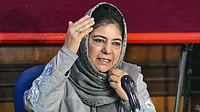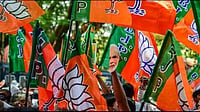Early this month, the Bharatiya Janata Party (BJP)-led Jammu Municipal Corporation (JMC) passed a unanimous resolution to change the name of the Sheikh Nagar area of Jammu to Shiv Nagar and Amphalla Chowk to Hanuman Chowk. The BJP argues that the people in the area also want the place to be renamed because there is a Shiv Mandir at Sheikh Nagar. Many in Kashmir consider the renaming as the BJP’s move to recreate new history in Jammu and Kashmir by erasing the aura of Kashmiri Muslim leaders even the ones as revered as Sheikh Abdullah.
“I don’t see it as rewriting history. I see it as recreating new history to project Kashmiri Muslims as non-entities having no contribution to the arts, culture and politics of J&K. Such brazen attempts failed during autocratic Dogra rule and they will not succeed even now,” says a senior PDP leader.
Also Read | How History Lessons Are Being Recast Online
The process of naming and renaming in J&K started soon after the abrogation of Article 370 in 2019. Kashmir’s water supply department was renamed ‘Jal Shakti Department’, and the Chenani-Nashri Tunnel was named after Hindutva ideologue Syama Prasad Mookerjee. A year after, in January 2020, the government cancelled two public holidays—December 5 that marks the birth anniversary of Sheikh Abdullah and July 13, observed as Martyrs’ Day after 22 Kashmiris were killed on this day in 1931, outside the Srinagar Central Jail where they had assembled to protest against the autocratic Dogra ruler.
On May 23 this year, the J&K government headed by Lt. Governor Manoj Sinha, announced that the image of Sheikh Abdullah embossed on the J&K Police medals for gallantry and meritorious service would be replaced with the national emblem. Earlier on January 25, the General Administration Department had said the nomenclature of Sher-i-Kashmir Police Medal for Gallantry and Sher-i-Kashmir Police Medal for Meritorious Service has been changed to ‘Jammu and Kashmir Police Medal for Gallantry’ and ‘Jammu and Kashmir Police Medal for Meritorious Service’.
While efforts are on to remove Sheikh from official records and buildings; hurried moves are being made after the abrogation of Article 370 to project British-installed oppressive Dogra rulers as the patriotic and kind Hindu rulers to their Muslim subjects of Kashmir. A new textbook of history for Class 10 of the Jammu and Kashmir Board of School Education says, “It is worthy to mention that Maharaja of Jammu and Kashmir had never nourished anti-India feelings and was himself deadly against the British rule which is clear from the fact that while attending the First Round Table Conference in 1930 in London, he had supported the cause of India. It was here in this conference that Maharaja Hari Singh openly asserted that he was an Indian first and then the ruler of Jammu and Kashmir State.”
In January this year, the J&K government constituted a committee to decide whether the state should observe the birthday of the last autocratic Dogra ruler of J&K, Maharaja Hari Singh. The government order reads: “Sanction is hereby accorded to the constitution of a Committee regarding the issue of Commemoration of Birthday of Maharaja Hari Singh Ji and its observance, in general/under the Negotiable Instruments Act, 1881 in the Union territory of Jammu and Kashmir.” On the other hand, the government refuses to recognise Kashmir’s popular Muslim leaders such as Sheikh Abdullah, who played a vital role in the accession of J&K with the Indian Union in 1947. The BJP now describes his popular resistance movement against the last Dogra Maharaja Hari Singh as “criminal politics”.
Also Read | History Must Be A Lesson Of Our Past Glory
BJP leader Kavinder Gupta says there is no rationale behind naming Agriculture University and the Police Academy in the name of Sheikh Abdullah as these institutions should be named after those valiant personalities who sacrificed their lives for the nation. About 76 educational institutions will be named after security personnel who were killed in J&K, plus SPOs and constables of the J&K Police, and soldiers killed during the militancy.
Senior BJP leader and former professor of history at the University of Jammu, Dr Nirmal Singh, says only facts are being brought to the fore.
Also Read | Revision Of History Textbooks A Political Agenda
He says, “Earlier the Maharaja’s role was not mentioned at all in any textbook. Rather he was projected as anti-people, anti-Muslim and the one who was not for the national integration. Now it is being balanced.”
He adds that facts are there for all historians and now interpretation is being balanced.
“Take out any book on Jammu and Kashmir being taught to students. You won’t see a single reference about Maharaja Hari Singh. Maharaja acceded J&K to the Indian Union. He spoke at the Round Table Conference. He was the person who started land reforms. It was during his rule Harijans were given entry into temples. He was a great reformer,” says Prof. Singh.
As for Sheikh Abdullah’s role, Prof Singh says it is there and known to everyone: “No one can ignore it. But it should also be said why he was arrested in 1953. He was close to Jawaharlal Nehru and ultimately the same Nehru arrested him. Right from 1931, his (Sheikh’s) agenda was based on criminalism. Everything needs to be written.”
The history textbook of Class 10 to an extent compliments the views of Dr Singh. It divides Jammu and Kashmir’s history into three different phases. The first phase is from 1947 to 1965. While the chapter says a comprehensive plan for social, economic, political and cultural reconstruction was designed under Naya Kashmir, it is not kind to Sheikh Abdullah’s land-to-tiller reforms. Sheikh Abdullah, the textbook says, by an executive order enacted land laws and passed Big Landed Estates Abolition Act 1950. “Through this act, landlordism in the state was abolished by transferring land to the tiller without giving any compensation to actual land owners.”
The second phase talks at length about the politics of Jammu and Kashmir from 1965 to 1982 including the arrest of Sheikh Abdullah on August 9, 1953, but leaves most of the past 30 years mentioning them briefly.
“There came a shift in the thinking of Sheikh Abdullah. During the later years of his rule, in many of his speeches, Abdullah tried to mislead the people of the region on the issue of the self-determination of the Jammu and Kashmir state which created apprehensions about his intentions among the Indian leaders. As such the government of India started losing faith in him. Consequently, he was arrested in 1953 and was imprisoned. Thereafter, his deputy Bakshi Ghulam Mohammad became the next Prime Minister of J&K in 1953,” reads the text.
The third phase in J&K, according to the Class 10th history text, starts in 2019. It says, “On 5th August 2019 the parliament amended Article 370 and abrogated Article 35A under J&K Reorganisation Act, 2019. This Act came into force on 31st October 2019.” The text then enumerates the benefits of the J&K Reorganisation Act.
The plan seems to unmake Sheikh plus the old order of traditional political parties like the J&K National Conference (JKNC) and the J&K Peoples Democratic Party (JKPDP), and to replace these with new political faces. Thus, Dogra rulers are becoming nicer in official history texts, while Sheikh Abdullah is becoming unpatriotic.
“It is people who make or unmake political parties. If people are falling for new leadership, it is their democratic right. If anyone creates law and order problems, speaks against the country, the law will take its course and it is not unmaking of political parties,” argues Dr Singh.
To a large extent, New Delhi has succeeded in accomplishing a political make-over as parties like the JKNC and the JKPDP have receded in the background. Most of the separatist leaders are either in jail or are maintaining complete silence.
Before August 5, Kashmir used to have an active civil society group and vibrant local newspapers. Most of the local media now faithfully reproduces government press releases and the old civil society has gone into oblivion. All the news is devoted to covering government press releases, Lt Governor’s statements and opinion pages prefer anything other than political commentary.
National Conference spokesperson Ifra Jan says the BJP is not only rewriting history but they are trying to rewrite the imagination of our identity: “Our perception of what happened, who our tormentors are, and our identity. It is an attempt at widespread social engineering through multi-dimensional information warfare. So, your street is now not called what you used to call it as a child, your newspaper now reads like a government hand-out, and your calendar has new events. It is also a desperate bid to remove Sher-i-Kashmir Sheikh Mohammad Abdullah’s huge imprint on the politics of J&K as new proxy political parties are being propped up and supported by New Delhi.”
Officially for the BJP, the new dawn or Naya Kashmir has emerged only after August 5, 2019, in Kashmir for the first time in its 70 years of history, and it is balancing history. Dr Singh observes, “Isn’t it new Kashmir where there are no shutdowns and stone-throwing? Aren’t tourists thronging Kashmir? If a new vibrant civil society is condemning acts of violence by terrorists, what is wrong with it? It never happened earlier.”


























